What Parents and Carers Need to Know About Smartphone Emergency SOS Functions
You might not know it – even if you have one – but most new smartphones include an array of emergency functions that could prove invaluable to you in a crisis. From sending notifications to specified contacts to connecting you rapidly with the emergency services, it’s no exaggeration to say that your phone could potentially save your life – or help you save someone else’s – in a matter of seconds.
This week, our guides outline how to use the SOS functionality on three of the most popular types of phone: iPhones, Samsung and Google. Find out how to make an emergency call with just five clicks of a button, how to notify first responders of essential medical information and how to automatically inform friends and family of your location.
https://nationalonlinesafety.com/guides/samsung-sos-call
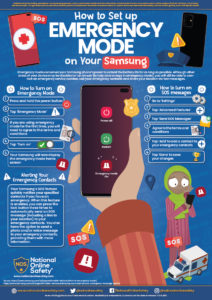
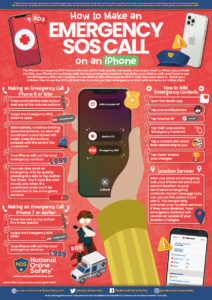
What Parents and Carers Need to Know About ‘Rec Room’
Rec Room is another one of those games which surged in popularity during the pandemic. It’s user base trebled in 2020, as players realised that the platform’s ‘open-world’ nature and interactivity were a way of replicating social contact. In-game events reflected that, with rooms set up to happy hours, birthday parties, maths tutorials and even therapy sessions.
Rec Room became an unexpected breakout hit on the Xbox after its release on that platform towards the end of last year. As a more sociable alternative to the fast-paced, hyper-violent titles that historically dominate the Xbox game charts, its only real rival is Roblox – which is played almost exclusively by under-16s. With such a young user population experiencing the intensifying nature of virtual reality gameplay – as well as having the ability to chat privately in-game – it’s easy to see why many people have voiced safety concerns. Rec Room is kidSAFE certified, but worries over online bullying and inappropriate content have persisted.
https://nationalonlinesafety.com/hub/view/guide/rec-room
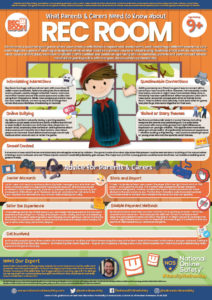
What Parents and Carers Need to Know About Chatroulette
Before Zoom, before Teams, there was Chatroulette. But users of that video calling software tended not to be offering anything as innocent as a quiz, and there was usually only one item on the agenda. A runaway word-of-mouth success on its launch in 2009, Chatroulette since seemed to have melted away into internet obscurity. But a surge of new users during lockdown appears to have brought it back from the brink. So what happens on Chatroulette calls? Is there really as much inappropriate content as popular opinion would suggest? Who uses the service? And is any part of it safe … at all? This week’s free #WakeUpWednesday guide investigates.
https://nationalonlinesafety.com/hub/view/guide/chatroulette
10 Apps Teens Are Using That Parents Need to Know

Coronavirus (COVID-19): keeping children safe online
Please visit the below website for advice and guidance to help parents and carers to keep children safe online during the coronavirus (COVID-19) outbreak.
To Support Mental Health Week: What Parents and Carers Need to Know About Supporting Children to Express Themselves Safely Online
It’s Children’s Mental Health Week – and with the effects of the Covid-19 pandemic still very much being felt around the world, the event has come at an especially relevant time. So which online activities can help to boost young people’s self-esteem? And how can make sure they’re doing it safely? Find out with our guide below or follow the link: https://nationalonlinesafety.com/hub/view/guide/supporting-children-to-express-themselves
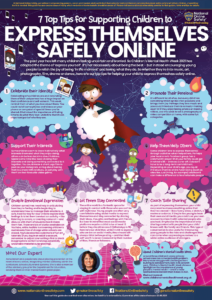
Wake Up Wednesday – Guide to WECHAT
More users than TikTok and Instagram but most people have not heard of it. WeChat is an all-in-one communications app for free text messaging, voice and video calls, photo sharing and games. Additionally, through “mini-programs” (apps integrated into the main WeChat platform), it becomes a one-stop shop by allowing users to do things like send payments, make purchases or book taxis, flights and hotels. Headquartered in Shenzhen, China, WeChat is one of the world’s most popular social media downloads, with around 980 million active user. National Online Safety have produced a helpful guide – check it out
Safer Internet Day 2021
Safer Internet Day is on 9th February 2021. The theme this year is ‘An internet we trust: exploring reliability in the online world’ The UK Safer Internet Centre has lots of helpful resources and information that you can find at Safer Internet Day 2021 | Safer Internet Centre
What Parents and Carers Need to Know About EBAY
But because eBay’s so familiar, does that mean it’s without risk? What are the possible issues and scams to look out for? And can you trust all the listings on the site?
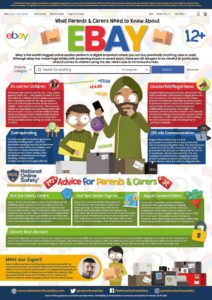
What Parents Need To Know About ‘Fake News’
In the current times there seems to be an awful lot of fake news circulating especially over social media platforms. This helpful guide will help inform you about fake news and how to spot it.

https://www.internetmatters.org/resources/online-gaming-advice/
Support for parents and carers to keep children safe online
Options for reporting or talking through online problems:
CEOP
The Child Exploitation and Online Protection (CEOP) Centre is dedicated to eradicating the sexual abuse of children. It is part of UK policing and very much about tracking and bringing offenders to account either directly or in partnership with local and international forces. Anybody with concerns that a pupil is being groomed or sexually exploited, including involvement in Sexting, should contact them directly using the link below. I would strongly recommend that if possible, you also contact Mr Lindsay or any member of the Safeguarding team here at Hurworth as we may need to make additional referrals to Children’s Services.
www.ceop.police.uk/safety-centre
Childline Instant Help
The link provided below will take you to the Childline website where you can click the explore button to find out more about topics such as Cyber Bullying and Online and Mobile Safety. More importantly if you click on the 1 to 1 Chat Online link you can contact a Childline counsellor in a 1 to 1 online chat (like instant messenger) about any online problems. Childline state that no problem is too big or too small.
ThinkUKnow
Here you can find the latest information on websites, mobiles and new technology. Find out what’s good, what’s not and what you can do about it. If you look after young people, there’s an area for you too with resources you can use at home or just to get yourself up to speed with the latest developments. Most importantly, there’s also a place which anyone can use to report if they feel uncomfortable or worried about someone they are chatting to online.
Here you can find a parents/carers guide to safely stream online and share images.
Delivering Online Safety at Home
Internet Watch Foundation
If you have inadvertently stumbled across potentially illegal online content, specifically images of child sexual abuse, criminally obscene material or anything that incites racial hatred then please submit a report to the Internet Watch Foundation (IWF). The IWF works in partnership with the police, government, the online industry and the public to combat this type of material and you are helping to make the internet safer for all by taking this action.
Options for finding information about online safety guidance:
All the websites listed above have both reporting tools and sections of information and advice relating to e-safety. In addition to these you may find the following useful:
The Twitter feed from the CEOP website has many tweets with up to date information about online safety. It covers the type of current activity taking place not only across the UK but also specifically what is happening regionally.
Get Safe Online
Get Safe Online is the UK’s leading source of unbiased, factual and easy-to-understand information on online safety.